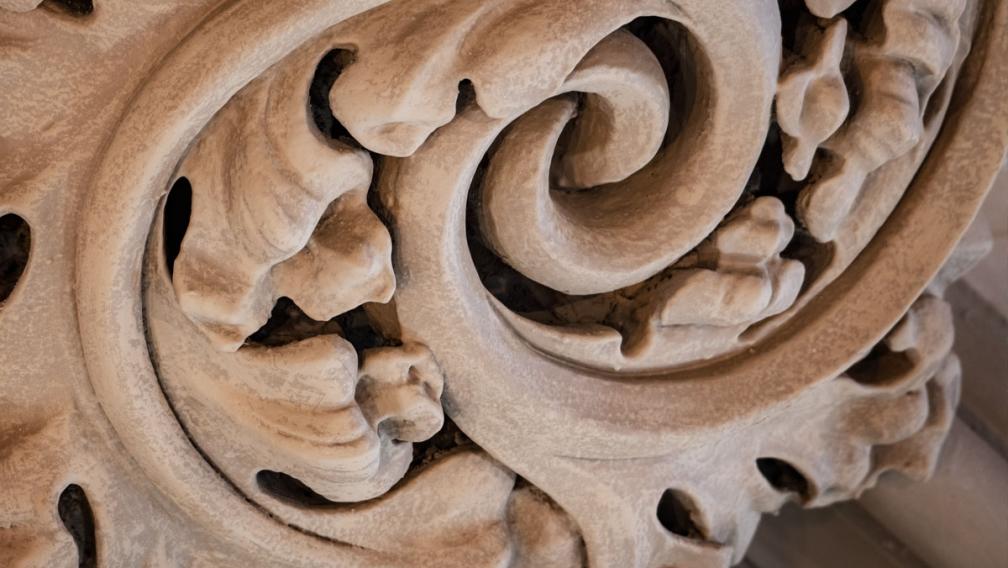Defiance Against the Void

“In the beginning when God created the heavens and the earth, the earth was a formless void and darkness covered the face of the deep, while a wind from God swept over the face of the waters. Then God said, ‘Let there be light’; and there was light. And God saw that the light was good; and God separated the light from the darkness. God called the light Day, and the darkness he called Night. And there was evening and there was morning, the first day” (Genesis 1:1–5 NRSV).
The beginning of 2021 is a beginning like no other. It goes without saying that 2020 was a hard year — unyielding in its barrage of change, grief, and uncertainty. The recent events in our Capitol add to a sense of sadness and anger, layering difficult emotions to process. As December fades from memory, as we pack up the Christmas ornaments and stare into winter, we still face so much. We do not know how things will pan out. How will the vaccine be fully distributed? When will we be able to embrace family members we have been unable to visit in person? When will we worship together in our beloved sanctuary? How can we shore up our courage to continue the work of justice in the face of great political divisions? How will we provide for those so desperately in need, now more than ever? We face a void.
And yet. In the lectionary on Sunday, the opening words of Genesis remind us that God’s creative purposes fill the emptiness with God’s perpetual light. The “formless void,” or what Robert Alter, capturing the rhythmic and rhyming lyricism of the original (tohu wa-bohu in Hebrew), hauntingly translates as, “welter and waste,” is wide open beneath God’s visionary intention. God’s wind and spirit hovers over this void. The light that God creates infuses the world, transforming the void, and this light is good. As theologian Jürgen Moltmann notes, “There is no external necessity which occasions [God’s] creativity” (God in Creation), and so the goodness of God’s creation is a gift, a defiance against the void. It is an antidote for cynicism. A fight against the nothing, the no-thing. God sees and speaks and breathes into the void, even when we cannot. A new year, then, even one such as this, is an occasion for wonder — for remembering the beauty and complexity of the astounding world that God has created, a world brimming with the possibility for good — a world full of light.
Blessings,
Summerlee Staten
Executive Director for Faith Formation and Education
Spiritual Resources
- The wonder of God’s creation is all around us. This time-lapse video of blooming flowers reminds us of the intricacy of God’s world.
- In “Primary Wonder,” poet Denise Levertov meditates on the mystery that there is something rather than nothing.
- Talented photographers zoom in on the intricate minutiae of nature, helping us to see a world in every leaf, a universe in every snowflake.
- The daily practice of mindfulness opens us to see God’s wonders with fresh eyes.
- Explore Baptism with children through storytelling and picture books.
- Celebrate Epiphany at home.
- Family Worship: Home Edition
Children’s Time
Sundays at 10am | Online
Join us for Children’s Time, now on meeting on Zoom. We’ll start with a brief opening assembly together and then, each week, children can choose from two different breakout groups.
Godly Play (Preschool and older)
Story: Epiphany
Materials: Construction paper, card stock, or paper for making a crown; drawing implements; collage materials.
What gifts shall I bring?
Whole People of God (2nd Grade and older)
Lesson: Jesus is Baptized
Materials: Chalk; a photo of your baptism (if you have one); card stock and writing/drawing implements to make “You are my beloved” welcome cards.
Enter, Jesus. Enter Jesus.
Register to join on Zoom, if you haven’t already.
Discovery
Sundays at 10am | Online
Discovery classes resume this week with a series on the prophets of the Hebrew Bible: Making All Things New. Join Summerlee Staten, Trinity’s Executive Director of Faith Formation and Education, in a discussion on the prophet Amos and how he speaks to the social justice issues of our own time. We’ll consider how we might look to reshape our society in light of recent turmoil, and how the Hebrew prophets offer a vision of a just society where all can thrive.





